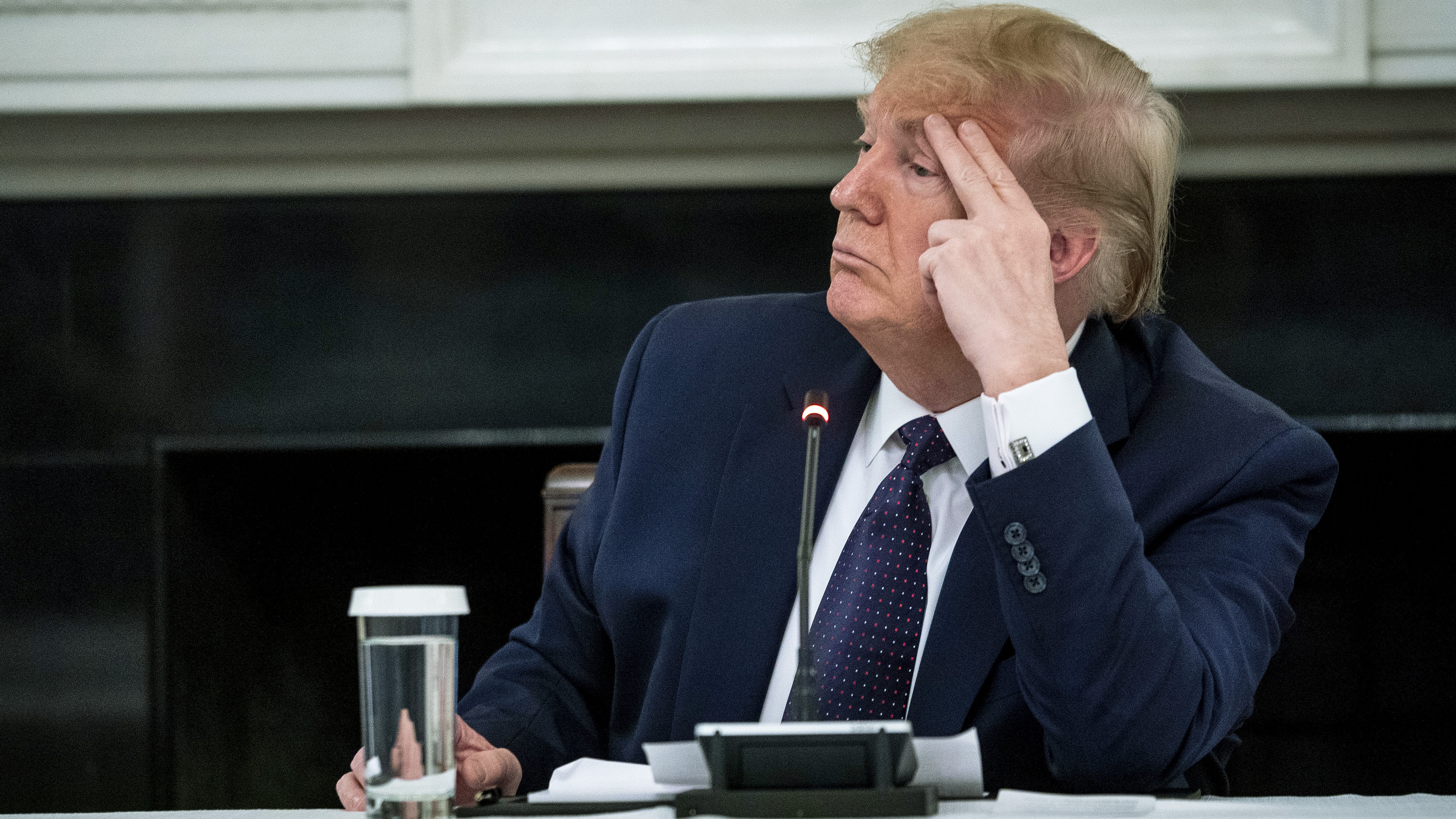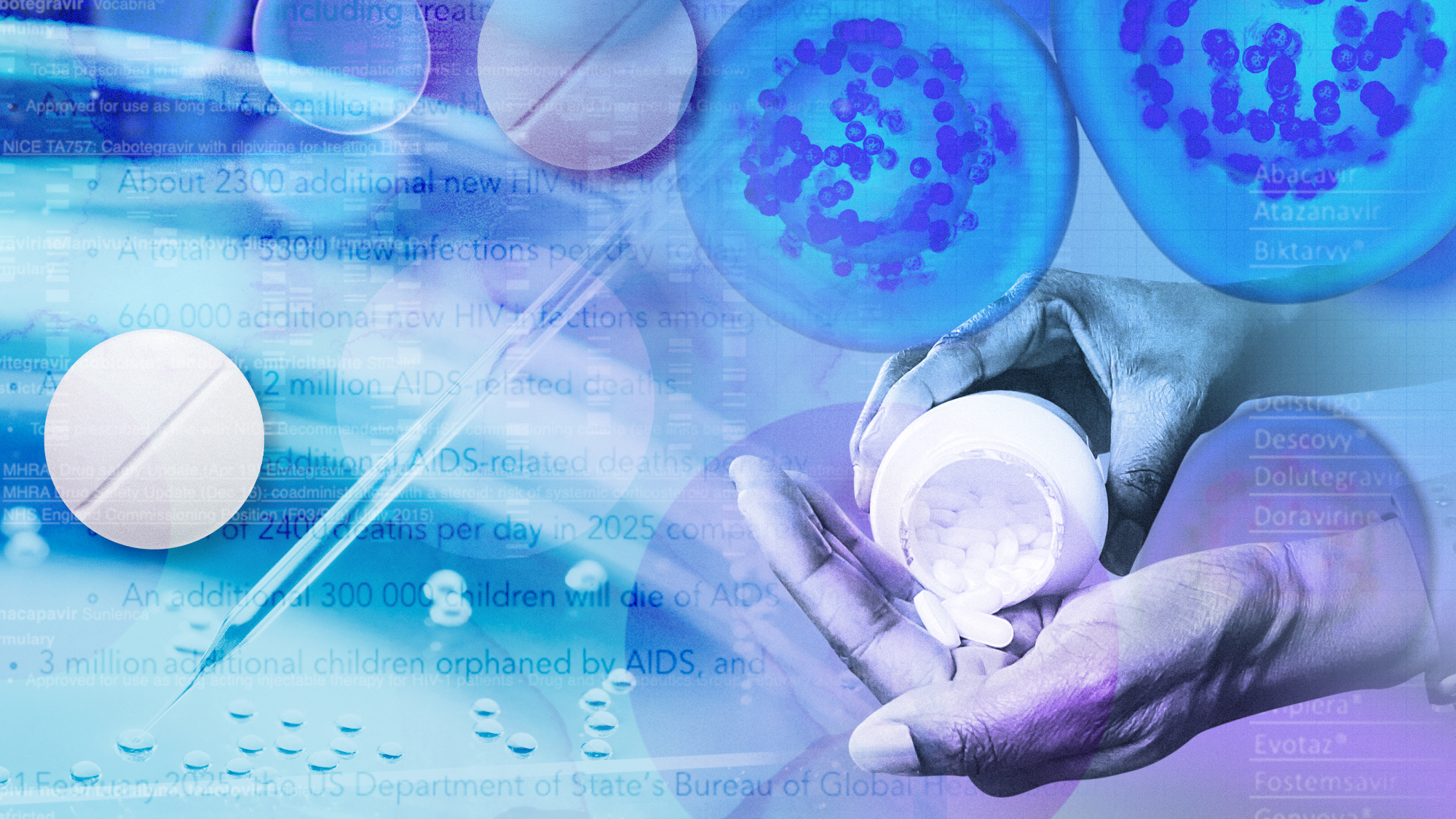Donald Trump’s obsession with hydroxychloroquine explained
US president claims he is taking unproven drug in effort to ward off coronavirus

A free daily email with the biggest news stories of the day – and the best features from TheWeek.com
You are now subscribed
Your newsletter sign-up was successful
US President Donald Trump has said he is taking daily doses of hydroxychloroquine, despite public health officials repeatedly warning that the drug may be unsafe.
Speaking at the White House, Trump told reporters he recently started taking the medication, intended to treat malaria and lupus, to fend off the coronavirus.
“I'm taking it for about a week and a half now and I'm still here, I'm still here,” the president said. There is no evidence hydroxychloroquine can fight coronavirus, the BBC says, with regulators warning that the drug may in fact cause heart problems.
The Week
Escape your echo chamber. Get the facts behind the news, plus analysis from multiple perspectives.

Sign up for The Week's Free Newsletters
From our morning news briefing to a weekly Good News Newsletter, get the best of The Week delivered directly to your inbox.
From our morning news briefing to a weekly Good News Newsletter, get the best of The Week delivered directly to your inbox.
Responding to the news that Trump was taking the drug, Democratic Speaker of the US House of Representatives Nancy Pelosi said she “would rather he not be taking something that has not been approved by the scientists”.
Unable to resist a dig at the president, she added: “Especially in his age group and in his… weight group - morbidly obese, they say.”
What is hydroxychloroquine?
Hydroxychloroquine is a medication predominantly used to prevent and treat malaria. It is very similar to chloroquine, one of the oldest and best-known anti-malarial drugs.
A free daily email with the biggest news stories of the day – and the best features from TheWeek.com
“But the drug – which can also treat auto-immune diseases like rheumatoid arthritis and lupus – has also attracted attention over the past few decades as a potential antiviral agent,” says the BBC.
What has the president said?
Trump first expressed an interest in hydroxychloroquine in early March, after discussing it with Larry Ellison, the billionaire founder of Oracle, the US computer technology firm.
At the time, Dr Mehmet Oz, the host of US television’s The Doctor Oz Show, was in touch with the president’s advisers about expediting approval to use the drug for coronavirus.
In early April, Trump used a media briefing on Sunday to talk up the benefits of the drug. “What do you have to lose?” he asked five times at the press conference. Acknowledging that it could pose particular risks to patients with heart problems, Trump said: “Yes, the heart stuff.”
In his surprise announcement this week, Trump told reporters that “all I can tell you is, so far I seem to be OK.” He added that the “only negative” he had heard about the drug was from a “very unscientific report” conducted by “people that aren’t big Trump fans”.
The BBC notes that the president appeared to be referencing a preliminary study from April of Covid-19 patients in US government-run hospitals for military veterans. The broadcaster adds that the study “suggested hydroxychloroquine had no benefit and may have even caused a greater rate of deaths”.
–––––––––––––––––––––––––––––––For a round-up of the most important stories from around the world - and a concise, refreshing and balanced take on the week’s news agenda - try The Week magazine. Start your trial subscription today –––––––––––––––––––––––––––––––
Why is he so keen on hydroxychloroquine?
Several pharmaceutical companies stand to profit if hydroxychloroquine becomes an accepted treatment, including shareholders and senior executives close to the president.
“Trump himself has a small personal financial interest in Sanofi, the French drugmaker that makes Plaquenil, the brand-name version of hydroxychloroquine,” reports The New York Times.
Sanofi’s largest shareholders include Fisher Asset Management, the mutual fund company run by Ken Fisher, a major donor to Republicans, including Trump, says the paper. Another investor in Sanofi is Invesco, the fund previously run by Wilbur Ross, Trump’s commerce secretary.
In 2019, Trump revealed that his three family trusts each had investments in a Dodge & Cox mutual fund, whose largest holding was in Sanofi. Trump’s attorney, Rudy Giuliani, has denied any financial motive after advising the president to advocate using hydroxychloroquine as a drug to combat coronavirus.
Joshua Rosenberg, an intensive care doctor at Brooklyn Hospital Center, said: “I certainly understand why the president is pushing it. He’s the president of the United States. He has to project hope.
“And when you are in a situation without hope, things go very badly. So I’m not faulting him for pushing it even if there isn’t a lot of science behind it, because it is, at this point, the best, most available option for use.”
Does it work?
The International Society of Antimicrobial Chemotherapy published a French study preaching the benefits of hydroxychloroquine, but has since condemned that research, saying: “The article does not meet the society’s expected standard.”
“The gold standard for a clinical trial is a double-blinded, randomized controlled trial,” says The Guardian. “The French hydroxychloroquine study did not follow any of these rules.”
Andrew Noymer, a professor of public health at the University of California, Irvine, described the results of the French study as “meaningless”.
Some Swedish hospitals that had been using the drug to try to treat coronavirus have stopped its use after adverse side-effects, according to Swedish news reports.
But New York governor Andrew Cuomo has asked Trump to increase the federal supply of hydroxychloroquine to New York pharmacies, allowing the state to lift a limit on purchases.
“There has been anecdotal evidence that it is promising,” Cuomo said at the time, while noting the lack of a recognised study.
The US Food and Drug Administration (FDA), which had already approved hydroxychloroquine as a treatment for malaria and lupus, issued an emergency order in late March which allowed doctors to administer it to coronavirus patients, reports the NYT.
Dr Roy Gulick, the head of infectious diseases at Weill Cornell Medicine, said hydroxychloroquine was being administered on a case-by-case basis. “We explain the pros and cons and explain that we don’t know if it works or not,” he said.
Trump said the federal government would distribute 29 million doses, and he had personally called Indian Prime Minister Narendra Modi to request more.
But the government’s top infectious diseases specialist, Dr Anthony Fauci, is not convinced the drug is a miracle cure, or even safe. Asked whether hydroxychloroquine should be considered a treatment for Covid-19, Fauci said on 24 March: “The answer is no.”
-
 ‘Zero trimester’ influencers believe a healthy pregnancy is a choice
‘Zero trimester’ influencers believe a healthy pregnancy is a choiceThe Explainer Is prepping during the preconception period the answer for hopeful couples?
-
 AI surgical tools might be injuring patients
AI surgical tools might be injuring patientsUnder the Radar More than 1,300 AI-assisted medical devices have FDA approval
-
 9 products to jazz up your letters and cards
9 products to jazz up your letters and cardsThe Week Recommends Get the write stuff
-
 A Nipah virus outbreak in India has brought back Covid-era surveillance
A Nipah virus outbreak in India has brought back Covid-era surveillanceUnder the radar The disease can spread through animals and humans
-
 The stalled fight against HIV
The stalled fight against HIVThe Explainer Scientific advances offer hopes of a cure but ‘devastating’ foreign aid cuts leave countries battling Aids without funds
-
 Obesity drugs: Will Trump’s plan lower costs?
Obesity drugs: Will Trump’s plan lower costs?Feature Even $149 a month, the advertised price for a starting dose of a still-in-development GLP-1 pill on TrumpRx, will be too big a burden for the many Americans ‘struggling to afford groceries’
-
 Covid-19 mRNA vaccines could help fight cancer
Covid-19 mRNA vaccines could help fight cancerUnder the radar They boost the immune system
-
 Can TrumpRx really lower drug prices?
Can TrumpRx really lower drug prices?Today’s Big Question Pfizer’s deal with Trump sent drugmaker stocks higher
-
 The new Stratus Covid strain – and why it’s on the rise
The new Stratus Covid strain – and why it’s on the riseThe Explainer ‘No evidence’ new variant is more dangerous or that vaccines won’t work against it, say UK health experts
-
 Why are autism rates increasing?
Why are autism rates increasing?The Explainer Medical experts condemn Trump administration’s claim that paracetamol during pregnancy is linked to rising rates of neurodevelopmental disorder in US and UK
-
 RFK Jr. vaccine panel advises restricting MMRV shot
RFK Jr. vaccine panel advises restricting MMRV shotSpeed Read The committee voted to restrict access to a childhood vaccine against chickenpox